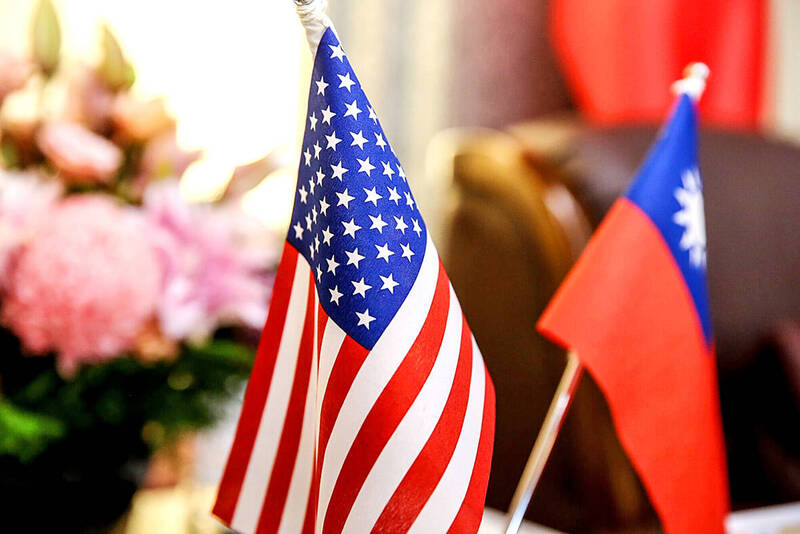The government would work to ensure that the nation’s investments in the US, especially in the semiconductor industry, serve the interests of both sides, a Taiwanese national security official said, speaking on condition of anonymity.
The government would not force Taiwanese companies to invest in any specific location, but was planning to engage with those looking to expand overseas to understand their needs better, the official said, adding that the government’s role would be to assist those companies in addressing challenges they might face and ensure that discussions with the US “serve the core interests” of both sides.
The government would not restrict tech exports, but it remains a question of whether the US has sufficient workforce and expertise to support the entire semiconductor manufacturing supply chain, the official said.

Photo: Bloomberg
Taiwan Semiconductor Manufacturing Co (台積電) is building advanced chip plants in the US, the official said, referring to the company’s estimated US$65 billion investment in three semiconductor fabs in Arizona.
The Taiwan-US relationship is not competitive, but rather complementary, and the government remains confident it can maintain and improve its ties with Washington, the official said.
The official’s comments came shortly after President William Lai (賴清德) on Friday convened a high-level national security meeting in the wake of US President Donald Trump’s renewed pledge to impose tariffs on Taiwanese semiconductors to encourage the movement of chip manufacturing to the US.
Lai said that the government would propose a special budget to increase the nation’s defense spending to more than 3 percent of GDP this year, as well as increase Taiwanese investments in the US.
Lai said the Executive Yuan is conducting a comprehensive inventory of opportunities for Taiwan-US economic and trade cooperation.
He also touted an initiative to promote semiconductor supply chain partnerships for democracies around the world, saying that Taiwan would collaborate with the US and other democratic partners to facilitate a more resilient and diversified semiconductor supply chain.
Speaking about Lai’s democratic semiconductor supply chain initiative, the official said the administration was hoping to bring together other semiconductor partners, including the US and Japan, to form “some kind of alliance.”
Taiwan is a global leader in producing advanced chips and is willing to further collaborate with other democratic countries on semiconductor supply chains, the official said.
Meanwhile, the White House has listed Taiwan’s pledge to boost investment in the US as one of Trump’s victories in the past week.
In an article titled “Wins Come All Day Under President Donald J. Trump” released on Friday, the White House listed dozens of items that it said were “a few of the many victories from the past week” for the US public under Trump.
Among them was “Taiwan pledged to boost its investment in the United States amid President Trump’s tariffs,” which included a hyperlink to a report by the Financial Times on Lai’s pledge to boost procurement and investment in the US in response to “Trump’s global tariff threats and pressure on Taiwan’s semiconductor industry.”

‘ABUSE OF POWER’: Lee Chun-yi allegedly used a Control Yuan vehicle to transport his dog to a pet grooming salon and take his wife to restaurants, media reports said Control Yuan Secretary-General Lee Chun-yi (李俊俋) resigned on Sunday night, admitting that he had misused a government vehicle, as reported by the media. Control Yuan Vice President Lee Hung-chun (李鴻鈞) yesterday apologized to the public over the issue. The watchdog body would follow up on similar accusations made by the Chinese Nationalist Party (KMT) and would investigate the alleged misuse of government vehicles by three other Control Yuan members: Su Li-chiung (蘇麗瓊), Lin Yu-jung (林郁容) and Wang Jung-chang (王榮璋), Lee Hung-chun said. Lee Chun-yi in a statement apologized for using a Control Yuan vehicle to transport his dog to a

Taiwan yesterday denied Chinese allegations that its military was behind a cyberattack on a technology company in Guangzhou, after city authorities issued warrants for 20 suspects. The Guangzhou Municipal Public Security Bureau earlier yesterday issued warrants for 20 people it identified as members of the Information, Communications and Electronic Force Command (ICEFCOM). The bureau alleged they were behind a May 20 cyberattack targeting the backend system of a self-service facility at the company. “ICEFCOM, under Taiwan’s ruling Democratic Progressive Party, directed the illegal attack,” the warrant says. The bureau placed a bounty of 10,000 yuan (US$1,392) on each of the 20 people named in

The High Court yesterday found a New Taipei City woman guilty of charges related to helping Beijing secure surrender agreements from military service members. Lee Huei-hsin (李慧馨) was sentenced to six years and eight months in prison for breaching the National Security Act (國家安全法), making illegal compacts with government employees and bribery, the court said. The verdict is final. Lee, the manager of a temple in the city’s Lujhou District (蘆洲), was accused of arranging for eight service members to make surrender pledges to the Chinese People’s Liberation Army in exchange for money, the court said. The pledges, which required them to provide identification

INDO-PACIFIC REGION: Royal Navy ships exercise the right of freedom of navigation, including in the Taiwan Strait and South China Sea, the UK’s Tony Radakin told a summit Freedom of navigation in the Indo-Pacific region is as important as it is in the English Channel, British Chief of the Defence Staff Admiral Tony Radakin said at a summit in Singapore on Saturday. The remark came as the British Royal Navy’s flagship aircraft carrier, the HMS Prince of Wales, is on an eight-month deployment to the Indo-Pacific region as head of an international carrier strike group. “Upholding the UN Convention on the Law of the Sea, and with it, the principles of the freedom of navigation, in this part of the world matters to us just as it matters in the